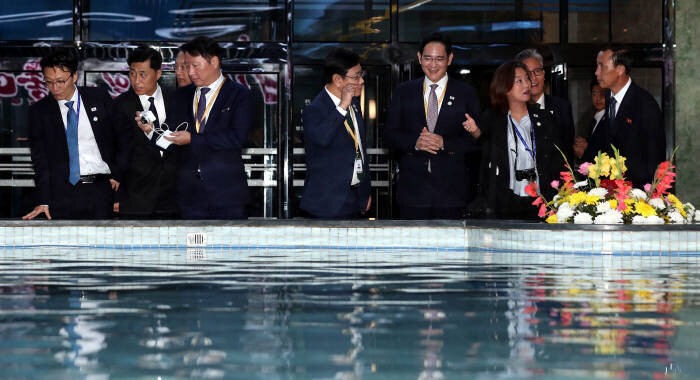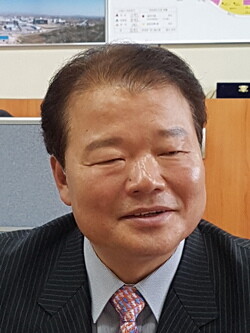hankyoreh
Links to other country sites 다른 나라 사이트 링크
North Korea emphasizes resuming operation of Kaesong “even without [wage] compensation”

North Korea proposed first resuming past efforts before pursuing other forms of economic cooperation during the recent inter-Korean summit in Pyongyang on Sept. 18–20, sources said.
In particular, Pyongyang voiced its wish to quickly resume operations at the Kaesong Industrial Complex “even without [wage] compensation.” Observers are now watching to see whether previously halted economic cooperation efforts such as operation of the Kaesong Complex and tourism at Mount Kumgang will gain new momentum in the wake of the South and North Korean leader’s Pyongyang Declaration.
No official statements from chaebol chairmen who visited Pyongyang
But with no message forthcoming from leaders of the South’s top four business groups the day after they visited Pyongyang as part of the summit’s special entourage, the individual groups appear to be giving the matter deep consideration.
“The South and North Korean leaders at least agreed on their firm commitment to the Kaesong Complex project as a symbol of inter-Korean economic cooperation,” said Shin Han-yong, chairman of the Corporate Association of Gaeseong Industrial Complex (CAGIC), in a Sept. 21 interview with the Hankyoreh after visiting Pyongyang as part of the summit’s special entourage.
Signs of the North Korean officials desire to resume operation of the complex were also witnesses several times during the visit, Shin added.
“The North is expressing the view that its willing to resume operations even without compensation [in return for labor],” he said in reference to the sanctions against North Korea.
“It seems like we would be able to find some other approach, such as paying wages in cash while taking steps to foreclose the possibility of it being diverted to military ends, or substituting with payment in the form of daily essentials,” he suggested.
The Kaesong Complex was initially targeted by UN sanctions at the time construction began in June 2003, but was eventually granted an exemption as a “inter-Korean cooperation project” after negotiations between the South Korean government and UN.
NK has been maintaining and managing Kaesong facilities since 2016 closure

“We confirmed [during the Pyongyang visit] that the North has been maintaining and managing the facilities thoroughly since the Kaesong Complex’s closure [on Feb. 10, 2016] and making its own preparations for normalization,” Shin said.
Meeting with special entourage members in economic areas on the first day of the Pyongyang visit, North Korean Cabinet Vice Premier Ri Ryong-nam proposed “starting with the easy things, the things we have been doing” – an apparent reference to the Kaesong Complex and Mount Kumgang tourism projects.
The likelihood of tourism at Mount Kumgang resuming more than nine years after being halted is also seen as having grown. In a Sept. 20 summit report to the South Korean public, President Moon Jae-in explained that he had “asked for the North to lift confiscation measures for full-scale operation of the meeting area at the Mount Kumgang divided family reunion site, which [North Korean leader] Kim Jong-un agreed to do.”
With the two sides having more or less resolved their political differences on the normalization of Mount Kumgang tourism, the only question now is whether the UN will lift its measures against the North. In 2010, North Korea confiscated South Korean government assets within the Mount Kumgang tourism area – including the divided family meeting site, fire station, cultural hall, and hot springs – and froze various tourism facilities belonging to Hyundai Asan and others.
The subject of the two leaders’ recent spoken agreement concerns the divided family reception house, which was previously administered by the South Korean government. The two sides appear to have agreed on lifting confiscation measures so the site can be used as a “permanent meeting facility.”
Obstacles posed by UN sanctions
With the agreement to lift past confiscation measures according to “mutual need,” some are predicting North Korea is likely to go ahead with ending its freezes on individual Mount Kumgang tourism facilities. To be sure, the current UN sanctions against the North will need to be lifted before repair efforts can be carried out on infrastructure that has rusted or broken down due to disuse – or before Hyundai Asan can resume its tourism venture as a private business.
“North Korea will need to lift its freezes not just on the divided family reception house but other tourism infrastructure as well before we will be able to enter the facilities as a business and execute our concept for resuming the venture,” a Hyundai Group official said.
“The key question is whether the part about ‘as conditions allow’ in the Pyongyang Joint Declaration actually comes to pass,” the official added.
In sharp contrast with these high hopes for the Kaesong Complex and Mount Kumgang tourism project, the leaders of South Korea’s top four business groups all remained circumspect about concepts and possibilities for inter-Korean economic cooperation after visiting North Korea as part of the summit’s special entourage. Neither Samsung Electronics Vice Chairman Lee Jae-yong, LG Group Chairman Koo Kwang-mo, SK Group Chairman Chey Tae-won, nor Hyundai Motor Vice Chairman Kim Yong-hwan offered any particular messages on the matter on Sept. 21 after returning from Pyongyang the evening before.
The only notable response was from Chey, who said on Sept. 20 that he would “think about what kind of picture could be drawn [in North Korea] and how.” Koo reportedly shared some of his experiences in the North with holding company executives on Sept. 21, while Lee had no specific events scheduled. Working-level officials in the four groups cautiously noted that economic sanctions against North Korea are “still in effect,” adding that the companies cannot rush to pursue cooperation without the proper infrastructure in place.
By Park Soon-bin, senior staff writer, and Choi Ha-yan and Choi Hyun-june, staff reporters
Please direct comments or questions to [english@hani.co.kr]

Editorial・opinion
![[Column] Season 2 of special prosecutor probe may be coming to Korea soon [Column] Season 2 of special prosecutor probe may be coming to Korea soon](https://flexible.img.hani.co.kr/flexible/normal/500/300/imgdb/original/2024/0426/3317141030699447.jpg) [Column] Season 2 of special prosecutor probe may be coming to Korea soon
[Column] Season 2 of special prosecutor probe may be coming to Korea soon![[Column] Park Geun-hye déjà vu in Yoon Suk-yeol [Column] Park Geun-hye déjà vu in Yoon Suk-yeol](https://flexible.img.hani.co.kr/flexible/normal/500/300/imgdb/original/2024/0424/651713945113788.jpg) [Column] Park Geun-hye déjà vu in Yoon Suk-yeol
[Column] Park Geun-hye déjà vu in Yoon Suk-yeol- [Editorial] New weight of N. Korea’s nuclear threats makes dialogue all the more urgent
- [Guest essay] The real reason Korea’s new right wants to dub Rhee a founding father
- [Column] ‘Choson’: Is it time we start referring to N. Korea in its own terms?
- [Editorial] Japan’s rewriting of history with Korea has gone too far
- [Column] The president’s questionable capacity for dialogue
- [Column] Are chaebol firms just pizza pies for families to divvy up as they please?
- [Column] Has Korea, too, crossed the Rubicon on China?
- [Correspondent’s column] In Japan’s alliance with US, echoes of its past alliances with UK
Most viewed articles
- 1[Column] Season 2 of special prosecutor probe may be coming to Korea soon
- 2‘We must say no’: Seoul defense chief on Korean, USFK involvement in hypothetical Taiwan crisis
- 3N. Korean delegation’s trip to Iran shows how Pyongyang is leveraging ties with Moscow
- 4Amnesty notes ‘erosion’ of freedom of expression in Korea in annual human rights report
- 5[Editorial] Korea’s surprise Q1 growth requires objective assessment, not blind fanfare
- 6Division commander ordered troops to enter raging flood waters before Marine died, survivor says
- 7[Reportage] On US campuses, student risk arrest as they call for divestment from Israel
- 8Korea sees more deaths than births for 52nd consecutive month in February
- 9Is N. Korea threatening to test nukes in response to possible new US-led sanctions body?
- 10Is Japan about to snatch control of Line messenger from Korea’s Naver?